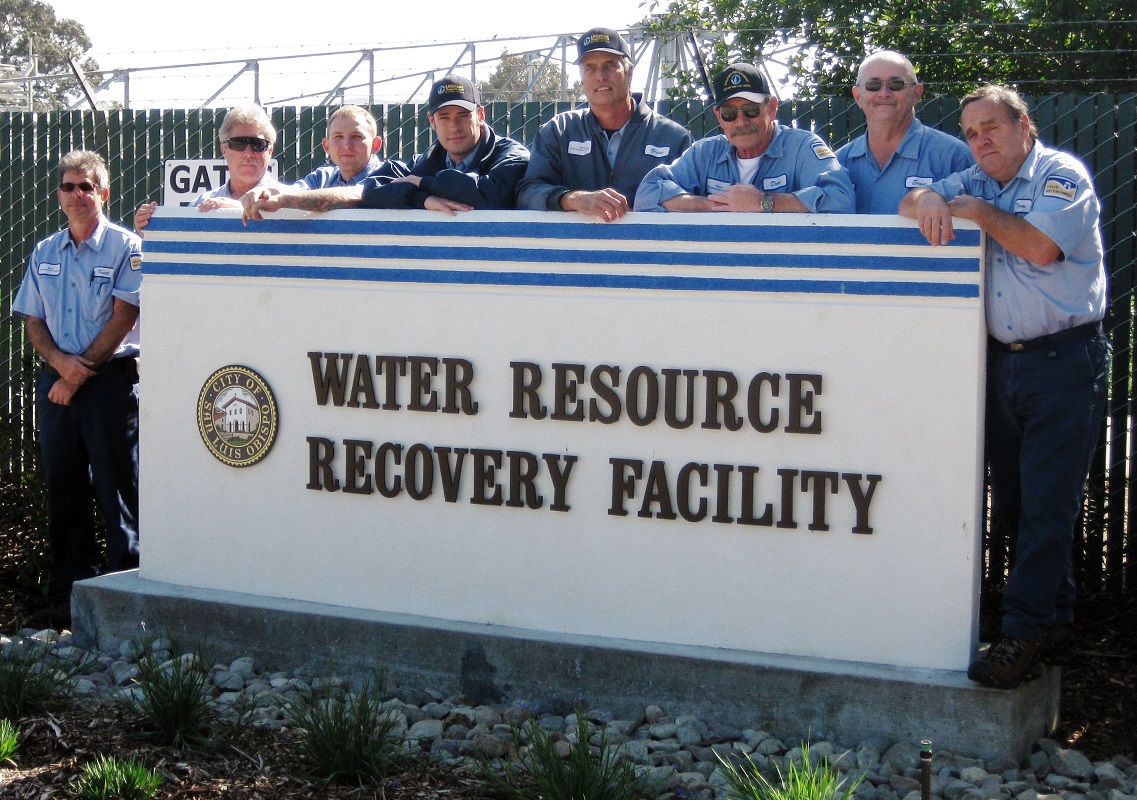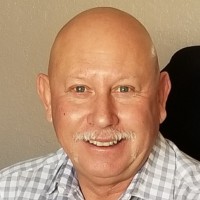
File photo: City of SLO WRRF Team
Howard Brewen
Water Resource Recovery Facility Superintendent (Retired)
Public Utilities
City of San Luis Obispo

Howard Brewen
Howard Brewen took the road less traveled to his position as superintendent of the Water Resource Recovery Facility for the City of San Luis Obispo. Raised on his family’s ranch in north San Luis Obispo County, he followed in his father’s and grandfather’s footsteps, obtaining his trainer’s license, issued by the California Horse Racing Board, at the young age of sixteen. He was accepted to UC Davis, achieving a Bachelor of Science degree in Animal Science.
To pay for his schooling, Howard put his trainer’s license to good use: he purchased a seasoned race horse that had fallen by the wayside, rehabilitated him, and raced him each summer on the state’s fair circuit, earning enough money to pay the following year’s tuition.
Howard built on his success on the fair circuit, expanding his racehorse stable to the major tracks in northern and southern California, eventually managing sixty horses and thirty employees.
After 20 years of big city life, Howard wanted to get back to his roots and returned to rural living in Paso Robles where he tried something completely different: a nine-month temporary position with the City of San Luis Obispo in its Wastewater Collections department. The only stipulation was that he commit to the full nine-month term.
“I found myself sitting in a wastewater collection ditch, listening to other more experienced operators talk about the challenges associated with this industry. I realized that I had the opportunity to contribute in a meaningful way to the public sector. This is an important industry filled with really great people.”
Howard began keeping journals and memoirs of his work experience, saving them for the day when he would have the opportunity to help improve the methods and processes used in the industry. At the end of his temporary contract, he was hired as a permanent full-time employee in Wastewater Collections, obtaining a Grade 3 Certification. After two and a half years in Collections, Howard transferred to the Water Reclamation Facility (later renamed the Water Resource Recovery Facility) where he worked his way up to a Grade 5 Wastewater Treatment Operator Certification, eventually being hired as Facility Superintendent.
Howard is also a long-time CWEA volunteer serving this year on the annual conference Educational Program Team.
What do you believe is the future of the water profession?
I absolutely believe to my core that this is the most exciting time ever to be in water. Who wouldn’t want to be a water professional? It’s such an exciting time because a myriad of factors and information have come together, and aligned, and the public is becoming more aware of the importance of water.
We have a series of opportunities, not challenges, ahead of us. The unique set of circumstances such as the drought, infrastructure awareness, and safe drinking water have all led to a public awareness of water that did not exist before.
But we’re moving from a time of having separate processes for water and wastewater. There is only one water cycle and we are moving to the point of having only one water profession; one that will encompass all aspects of the water cycle.
Potable reuse is a tremendous opportunity. That train has left the station and is gaining momentum. It is up to those of us in water to take new innovations and technologies and understand how to adapt those to this industry in a timely manner. We have to get beyond the traditional fifteen years it usually takes to implement ‘new’ technologies.
The huge retirement numbers we are facing is another opportunity. First of all, we need to find a way to retain the knowledge currently being carried around in all of these brains. Second, we need to know what kind of person we need to hire, not for just right now, but to hire the skill set that we’re going to need for three to five years down the line. It is important not to just hire the same as we have done in the past.
What are the current deficiencies in recruitment?
Posting a job on a website isn’t recruiting.
Facilities don’t like to do internships because of the extra work involved, extra duties for the certified operators and Human Resources doesn’t like the liability aspect of training.
What works for your organization in recruiting the new generation of water professionals?
Our internship program started with our lab and has expanded into operations.
We currently have three to four interns at any given time. Due to the success of our internship program we have a waiting list of applicants. We don’t advertise, but we do go into high schools, talk with people in colleges, and are committed to working with our returning veterans. We also have a cohort of thirty to forty-year-olds who are “just looking for a change.” Most are looking for an opportunity to contribute meaningfully to society and the public good.
We do not have the budget to pay our interns so they are working without pay, thirty to forty hours a week, for a full year or more. But ninety percent of our interns go directly into paying jobs.
Becoming an operator takes effort. They have to do the work, pass the tests, and take the certifications.
Having an internship program also means a lot of extra work for our operators. They do most of the work with the interns. We all know that someone at some time gave us a helping hand. Working with interns is an opportunity to pay forward to society and pay back to our own mentors and industry.
Training an intern slows down the day for the operators because they are not just ‘doing’ but are ‘teaching.’ It also keeps our operators sharp because these interns ask a lot of questions!
But, when it comes time to recruit for our plant, it’s a lot easier for us to find the appropriate person to fill a position. We know who’s going to be a good fit with our existing staff when an opening comes because we’ve already worked with them for a year or more. We have a great staff who are motivated and we have the opportunity to build on that success through our hiring.
Our interns are also in demand from other facilities: Success builds on success.
One of the downsides to the unpaid internships is our operators need to be careful of the working dynamic. These interns are doing hard work but don’t get the pay or the benefits our certified operators get. But, as I said, ninety percent of our interns go directly into paying jobs and the internship is a good opportunity to find out if a person is cut out for the position.
Another aspect that is important for any candidate to understand is the difference between a ‘job’ and a ‘career.’ One isn’t necessarily better or worse than the other but it is important that they know for themselves their ultimate goal. Having a goal means committing to working towards that goal, be it a ‘job’ or a ‘career’ in water.
What benefits have you seen personally from your membership in associations such as CWEA?
Our industry tends to be silo’d. We think we are working in isolation and our problems are unique to ourselves.
Being a part of CWEA, going to the conferences, made me realize “Water is a BIG thing.” The other part was “You are not alone!”
What are the benefits of membership in an association such as CWEA for younger water professionals?
CWEA shows the broader platform of the water industry and allows people to understand the scope of the industry. You get to meet people who have the same problems you do but have found innovative ways to solve these problems.
I cannot overemphasize the importance of networking. The better understanding you have of the broader picture, the more people you meet and talk to, the more opportunities will come your way.
Through CWEA, young individuals can participate in all aspects of the water cycle, aspects they may not have known even existed. They will have education opportunities plus opportunities to volunteer in meaningful ways.
CWEA expands horizons and presents untold and unknown opportunities.
Once they get involved in CWEA they will also come to appreciate the dedication of the people within the organization itself.
What are some bits of advice you would emphasize to anyone interested in succeeding in this field?
Do not be afraid of failing. The fear of failure holds back so many government agencies. We tend to go through the same thought processes and the same meetings in order to come to the same conclusions. The perception is ‘if you don’t fail, you’ll move up the ladder.’ It’s the safe way but not the best way to meet the opportunities we will be facing.
It’s also important to know the difference between a job and a career. This is something you need to know in your heart. It’s not something you have to share with anyone else but you need to know what you want to get out of your working life. You get out what you put in.
If you want to be a leader in this industry, learn and understand what a leader truly is. A leader isn’t just the person at the front. If a leader insists that they need to be out front, that’s ego, not leadership. A true leader can lead from the side, from the back or from the middle of the pack. A well-led organization can function without its leader. If your organization needs the leader to be there all the time, that person isn’t truly a leader.
Be your own person and be true to yourself. You cannot put a price on the feeling of contributing positively.
And finally, get involved. Take the opportunities presented to network, to learn, and to volunteer.
For more information: